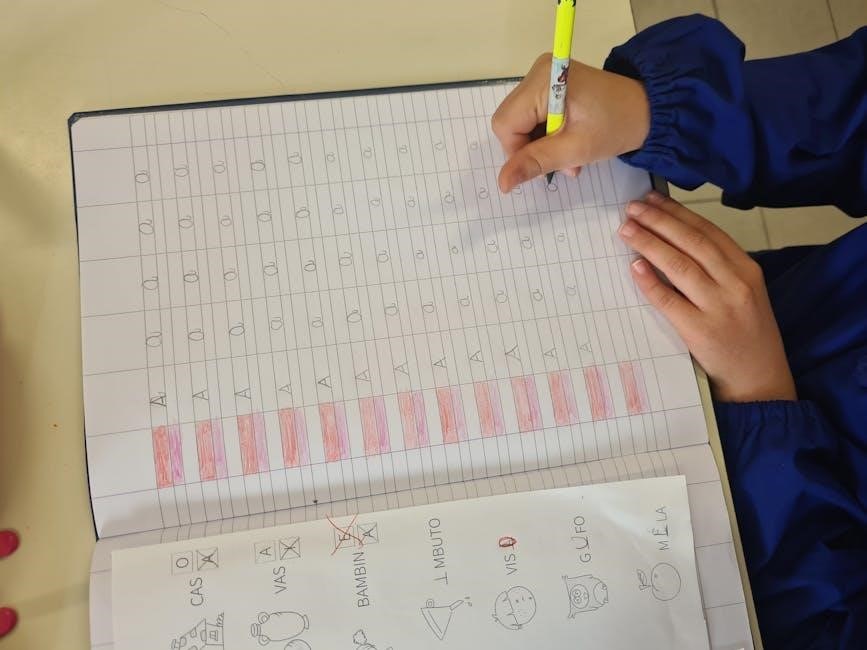
Dialectical Behavior Therapy (DBT) focuses on managing emotions and reducing self-destructive behaviors. The Pros and Cons Worksheet is a key DBT tool for structured decision-making, promoting objective analysis and self-reflection in crisis situations.
What is DBT?
Dialectical Behavior Therapy (DBT) is a psychotherapy approach developed by Marsha Linehan to help individuals manage emotional dysregulation, reduce self-destructive behaviors, and improve interpersonal relationships. It combines cognitive-behavioral techniques with mindfulness practices to foster balance between acceptance and change. DBT focuses on four core modules: mindfulness, distress tolerance, emotion regulation, and interpersonal effectiveness. These skills help individuals navigate emotional crises, communicate effectively, and maintain emotional stability. The Pros and Cons Worksheet is a practical tool within DBT, aiding in structured decision-making by weighing advantages and disadvantages, promoting objective analysis, and enhancing self-awareness during challenging situations.
The Role of the Pros and Cons Worksheet in DBT
The Pros and Cons Worksheet is a fundamental tool in DBT, designed to help individuals make informed decisions by systematically evaluating the advantages and disadvantages of a particular action. This worksheet encourages users to pause and reflect before acting impulsively, especially in emotionally charged situations. By listing both positive and negative outcomes, individuals can gain clarity and objectivity, reducing the likelihood of regretful decisions. The worksheet also serves as a means to practice mindfulness and self-validation, aligning with DBT’s emphasis on balancing acceptance and change. Regular use of this tool fosters better decision-making skills and enhances overall emotional resilience, making it an indispensable resource in the DBT framework.
Benefits of Using the Pros and Cons Worksheet
The Pros and Cons Worksheet offers numerous benefits, particularly in enhancing decision-making and emotional regulation; It provides a structured format for evaluating choices, fostering objectivity and reducing impulsive actions. By weighing advantages and disadvantages, individuals gain clarity and confidence in their decisions. This tool also promotes self-reflection, helping users identify patterns in their thinking and behaviors. Additionally, the worksheet encourages mindfulness, as it requires individuals to pause and assess situations before acting. Its simplicity makes it accessible for various scenarios, from everyday decisions to crisis management. Regular use of the worksheet can lead to improved emotional resilience and more balanced, thoughtful choices, aligning with DBT’s goals of fostering stability and well-being.

Mindfulness in DBT
Mindfulness is a core DBT skill, teaching individuals to observe thoughts and feelings non-judgmentally. It enhances self-awareness and emotional regulation, fostering calm and clarity in decision-making processes.
Definition and Importance of Mindfulness
Mindfulness, a cornerstone of DBT, involves observing thoughts, emotions, and sensations without judgment. It cultivates present-moment awareness, reducing emotional reactivity and enhancing clarity. By fostering non-judgmental acceptance, mindfulness helps individuals manage distress and make decisions more effectively. Regular practice strengthens emotional resilience and improves overall well-being, making it easier to navigate challenging situations with balance and composure. This skill is foundational for other DBT techniques, providing a stable base for emotional regulation and distress tolerance. Through mindfulness, individuals gain the ability to respond thoughtfully rather than react impulsively, leading to more constructive outcomes in daily life and decision-making processes.
How Mindfulness Relates to the Pros and Cons Worksheet
Mindfulness enhances the effectiveness of the Pros and Cons Worksheet by fostering a non-judgmental and present-focused mindset. When individuals approach decision-making with mindfulness, they can more objectively evaluate the advantages and disadvantages of a situation. This clarity reduces emotional bias and impulsive choices. By practicing mindfulness, users of the worksheet can better identify and weigh each factor, leading to more balanced and thoughtful decisions. Mindfulness also helps individuals stay calm and centered while analyzing complex emotions, ensuring that their pros and cons list reflects a clear and rational perspective rather than being clouded by emotional reactivity.
Practical Mindfulness Exercises for Decision-Making
Practical mindfulness exercises, such as observing thoughts without judgment and deep breathing, help individuals stay present while using the Pros and Cons Worksheet. These techniques reduce emotional reactivity, allowing for clearer decision-making. One exercise involves focusing on breath to calm the mind before analyzing pros and cons. Another is body scanning to release physical tension. Mindfulness practices like these create a stable mental state, enabling users to evaluate options more objectively. Regular mindfulness exercises enhance the effectiveness of the worksheet by fostering a non-judgmental and focused approach to decision-making, aligning with DBT’s emphasis on emotional regulation and clarity.

Distress Tolerance Skills
Distress tolerance skills help manage crises without worsening emotions. The Pros and Cons Worksheet aids in evaluating decisions during intense situations, promoting rational thinking and emotional stability.
Understanding Distress Tolerance
Distress tolerance is a DBT skill that helps individuals endure difficult emotions without escalating crises. It teaches techniques like radical acceptance and self-soothing to manage emotional intensity. The Pros and Cons Worksheet complements this by providing a structured way to evaluate decisions during distress, encouraging rational thinking over impulsive reactions. By practicing distress tolerance, individuals can reduce the likelihood of harmful behaviors and develop resilience. This skill is particularly useful in crisis situations, where emotions often cloud judgment. The worksheet acts as a tool to weigh options objectively, fostering better decision-making and emotional stability. Regular practice enhances one’s ability to navigate challenging emotions effectively.
Using Pros and Cons Lists for Crisis Situations
In crisis situations, DBT’s Pros and Cons list helps individuals evaluate decisions objectively, reducing impulsive reactions. By weighing the advantages and disadvantages of actions, this tool fosters rational thinking over emotional reactivity. It complements distress tolerance skills like radical acceptance and self-soothing, enabling individuals to manage intense emotions without escalating the situation. The worksheet encourages a structured approach, promoting clarity and reducing overwhelm. Regular use enhances decision-making abilities, particularly during high-stress moments. This practical technique is a cornerstone of DBT, aiding in crisis navigation by providing a clear framework for evaluating options and their potential outcomes, thereby supporting emotional resilience and effective problem-solving.
Radical Acceptance and Self-Soothing Techniques

Radical acceptance, a key DBT concept, involves fully acknowledging reality without judgment, reducing emotional suffering. Self-soothing techniques, such as deep breathing or grounding, help calm the body and mind during crises. These methods complement distress tolerance by teaching individuals to manage intense emotions without acting impulsively. Radical acceptance encourages individuals to accept situations they cannot change, fostering peace and reducing resistance. Self-soothing techniques provide immediate relief, creating a safe space for rational decision-making. Together, these skills enhance emotional resilience, allowing individuals to navigate challenging situations with greater ease and clarity, while aligning with the structured approach of the Pros and Cons Worksheet for effective crisis management.

Emotion Regulation
Emotion regulation in DBT helps individuals manage intense feelings, reducing vulnerability to emotional crises. The Pros and Cons Worksheet aids in identifying triggers and developing strategies to regulate emotions effectively.
What is Emotion Regulation in DBT?
Emotion regulation in DBT is a core skill that teaches individuals to manage and modulate their emotional responses. It focuses on recognizing, understanding, and accepting emotions without judgment. By learning to observe emotions as temporary states rather than defining features, individuals can reduce emotional intensity and develop adaptive coping strategies. This module builds on mindfulness and distress tolerance, providing practical techniques to handle emotional vulnerability. The Pros and Cons Worksheet is often used to evaluate the impact of emotions on decisions, helping individuals make more balanced choices; Effective emotion regulation enhances overall well-being and reduces the risk of impulsive behaviors.
Identifying and Understanding Emotions
Identifying and understanding emotions is a fundamental step in DBT, enabling individuals to recognize and label their feelings accurately. This skill helps in distinguishing between primary emotions (initial reactions) and secondary emotions (reactions to initial emotions). By gaining clarity on emotional triggers and patterns, individuals can better navigate their emotional landscape. The Pros and Cons Worksheet can be a useful tool in this process, allowing individuals to weigh the implications of acting on emotions versus managing them constructively; This awareness fosters emotional resilience and reduces the likelihood of being overwhelmed by intense feelings, promoting a more balanced and thoughtful response to emotional challenges.
Reducing Emotional Vulnerability with Pros and Cons
The Pros and Cons Worksheet in DBT helps individuals reduce emotional vulnerability by fostering a structured approach to decision-making. By evaluating the potential outcomes of actions, individuals can better manage intense emotions and avoid impulsive behaviors. This tool encourages a balanced perspective, allowing users to weigh both logical and emotional factors. Over time, this practice enhances emotional resilience, reducing the intensity of emotional reactions. The worksheet also aids in identifying patterns of emotional triggers, enabling individuals to develop targeted strategies for coping. Regular use of this tool promotes long-term emotional stability and equips individuals with practical skills to navigate challenging situations more effectively.

Interpersonal Effectiveness
Interpersonal effectiveness in DBT enhances communication skills, teaching individuals to express needs assertively while maintaining relationships. The Pros and Cons Worksheet aids in decision-making, fostering balanced assertiveness and understanding.
Building Effective Communication Skills
Building effective communication skills is a core component of DBT’s interpersonal effectiveness module. It focuses on expressing needs clearly while maintaining respect for oneself and others. The DEAR MAN and GIVE skills are central to this process, providing a structured approach to assertive communication. DEAR MAN encourages individuals to describe their feelings, express their needs, assert themselves, reinforce their requests, and stay mindful of their goals. GIVE skills promote listening, validation, and maintaining a respectful tone. The Pros and Cons Worksheet complements these skills by helping individuals weigh the potential outcomes of different communication strategies, fostering assertiveness without compromising relationships or self-respect.
DEAR MAN and GIVE Skills
DEAR MAN and GIVE are essential DBT skills for effective communication. DEAR MAN stands for Describe, Express, Assert, Reinforce, Mindful, Apologize (if necessary), and Negotiate. It helps individuals clearly state their needs while maintaining respect. GIVE skills—Be Gentle, Act Interested, Validate, and Use an Easy Manner—focus on maintaining relationships by being approachable and empathetic. Together, these skills promote assertiveness and collaboration. The Pros and Cons Worksheet can enhance their use by helping individuals evaluate the potential outcomes of different communication strategies, ensuring they balance their needs with others’ feelings. These skills are particularly useful in high-stakes interactions, fostering both effectiveness and harmony in relationships.
Using Pros and Cons for Assertive Communication
The Pros and Cons Worksheet is a valuable tool in DBT for enhancing assertive communication. By weighing the advantages and disadvantages of different communication approaches, individuals can make informed decisions that align with their goals. This structured process helps identify potential outcomes, reducing impulsivity and promoting thoughtful expression of needs. It encourages individuals to consider both their own desires and the feelings of others, fostering a balance between assertiveness and empathy. Regular use of the worksheet can improve decision-making skills, leading to more effective and respectful interactions. This method complements other DBT techniques, such as DEAR MAN and GIVE, by providing a clear framework for evaluating communication strategies.

Pros of DBT
DBT offers improved emotional regulation, enhanced communication skills, and effective coping mechanisms for crises, providing individuals with tools for better mental health management.
Improved Emotional Regulation
DBT enhances emotional regulation by teaching individuals to recognize, understand, and manage their emotions effectively. Through skills like mindfulness and distress tolerance, individuals learn to reduce emotional intensity and vulnerability. The Pros and Cons Worksheet helps identify emotional triggers and evaluate responses, fostering better decision-making. By practicing these techniques, individuals can develop a greater sense of control over their emotions, leading to improved relationships and overall well-being. This structured approach empowers individuals to navigate emotional challenges with clarity and resilience, making it a cornerstone of DBT’s effectiveness in managing emotional dysregulation.
Enhanced Communication Skills
DBT significantly improves communication skills through techniques like DEAR MAN and GIVE, which promote assertiveness and respect. These skills help individuals express needs clearly while maintaining relationships. The Pros and Cons Worksheet complements this by encouraging evaluation of communication strategies, ensuring decisions align with personal values. By practicing these tools, individuals develop the ability to navigate conflicts effectively and build stronger connections. Enhanced communication fosters mutual understanding and reduces misunderstandings, making it a vital component of DBT’s interpersonal effectiveness module. This skill set empowers individuals to express themselves confidently while respecting others, leading to more fulfilling interactions and relationships.
Effective Coping Mechanisms for Crises
DBT equips individuals with powerful tools to manage crises through distress tolerance techniques. The Pros and Cons Worksheet is particularly useful in high-stress situations, helping users evaluate options objectively. By identifying pros and cons, individuals can make informed decisions, reducing impulsive reactions. Techniques like radical acceptance and self-soothing further enhance resilience, allowing individuals to tolerate distress without escalating emotions. These skills empower people to navigate crises more effectively, minimizing harm and promoting emotional stability. The worksheet serves as a practical guide, ensuring decisions align with long-term goals rather than short-term relief. This structured approach strengthens coping mechanisms, enabling individuals to handle crises with greater confidence and clarity.

Cons of DBT
DBT may be challenging to master initially, requiring consistent practice and time commitment. Exercises can evoke intense emotions, potentially overwhelming some individuals during the learning process.
Initial Difficulty in Mastering Skills
Mastering DBT skills can be challenging, especially for newcomers. The Pros and Cons Worksheet, while helpful, may feel overwhelming at first due to its structured nature. Many individuals struggle with identifying and balancing emotions, leading to frustration. The worksheet requires consistent practice to become effective, which can be discouraging for those seeking quick results. Additionally, the emotional intensity of exercises may feel overwhelming, causing some to hesitate in continuing. However, persistence is key, as these skills eventually become second nature, offering long-term benefits for emotional regulation and decision-making.
Time Commitment for Practice
DBT skills, including the use of the Pros and Cons Worksheet, require consistent practice to yield benefits. This time commitment can be challenging, as regular dedication is essential for mastering techniques. The worksheet itself demands effort to complete thoughtfully, especially during emotional crises. Balancing practice with daily life can be difficult, particularly for those with busy schedules. Additionally, the emotional intensity of some exercises may make it hard to maintain regular practice. However, the long-term improvements in emotional regulation and decision-making often make the investment of time worthwhile for those committed to their mental health journey.
Emotional Intensity During Exercises
DBT exercises, including the Pros and Cons Worksheet, can evoke strong emotions, especially when addressing sensitive topics. This emotional intensity may feel overwhelming, as individuals confront painful thoughts or memories. The process of weighing pros and cons can stir feelings of anxiety or sadness, particularly in crisis situations. While this intensity is challenging, it often indicates progress in understanding and managing emotions. Practitioners may need to take breaks or use distress tolerance techniques to navigate these moments. Despite the discomfort, the emotional engagement can lead to deeper insights and personal growth, making the exercises valuable for long-term emotional regulation and resilience.

Pros of the Pros and Cons Worksheet
The Pros and Cons Worksheet offers a structured decision-making process, encouraging objective analysis and facilitating self-reflection. It helps individuals weigh options clearly, enhancing awareness and clarity in choices.
Structured Decision-Making Process
The Pros and Cons Worksheet provides a clear framework for decision-making, helping individuals systematically evaluate options. By listing advantages and disadvantages, users can visualize potential outcomes, reducing overwhelm. This method encourages logical thinking, making it easier to identify priorities. It also allows for external review, adding objectivity to personal choices. The structured format ensures that no aspect is overlooked, fostering balanced and informed decisions. This tool is particularly useful in crisis situations, where emotions may cloud judgment, guiding users toward more rational and effective solutions. Regular use enhances decision-making skills over time, promoting clarity and confidence.
Encourages Objective Analysis
The Pros and Cons Worksheet fosters objective analysis by separating emotions from facts, allowing users to evaluate decisions logically. This tool reduces emotional bias, encouraging a balanced perspective. By weighing advantages and disadvantages, individuals can identify patterns and areas for improvement. The structured format helps in recognizing potential consequences, making decisions more informed. Over time, this practice enhances critical thinking and problem-solving skills, leading to more effective choices. The worksheet also promotes self-awareness, helping users understand their priorities and values. This objective approach is particularly beneficial in high-stress situations, where emotions might otherwise dominate decision-making. Regular use cultivates clarity and confidence in navigating life’s challenges.
Facilitates Self-Reflection and Awareness
The Pros and Cons Worksheet is a powerful tool for fostering self-reflection and awareness in DBT. By systematically evaluating choices, individuals gain insight into their thoughts, feelings, and motivations. This process encourages users to explore their values and priorities, promoting a deeper understanding of themselves. The worksheet helps identify patterns in decision-making, revealing areas for personal growth. It also enhances awareness of emotional triggers and their impact on choices. Regular use of the worksheet cultivates mindfulness and introspection, enabling individuals to make more intentional decisions. Over time, this practice strengthens self-awareness, a cornerstone of emotional regulation and personal development in DBT.

Cons of the Pros and Cons Worksheet
The Pros and Cons Worksheet may lead to overanalysis, potentially ignoring emotional factors, and requires consistent practice to remain effective, which can be challenging for some individuals.
Potential for Overanalysis
The Pros and Cons Worksheet can sometimes lead to overanalysis, where individuals spend excessive time weighing options, potentially causing indecision and stress. This overthinking may hinder the decision-making process, as the detailed list can become overwhelming. While the worksheet is designed to promote clarity, it can inadvertently create complexity, especially for those prone to rumination. Balancing thorough analysis with timely action is crucial to avoid getting stuck in an endless cycle of evaluation. This potential drawback highlights the importance of using the tool judiciously, ensuring it serves as an aid rather than a barrier to effective decision-making in DBT practices.
May Not Account for Emotional Factors
The Pros and Cons Worksheet may not fully capture emotional factors, as it focuses on logical analysis. Emotions often play a significant role in decision-making, and relying solely on a list might overlook intuitive or emotional needs. While the worksheet encourages objective evaluation, it may not adequately address how emotions influence choices. This can lead to decisions that logically make sense but feel unsatisfying or misaligned with personal values. Balancing rational analysis with emotional awareness is essential for holistic decision-making in DBT practices, ensuring that both mind and heart are considered in the process.
Requires Consistent Practice
The Pros and Cons Worksheet is most effective when used consistently, as irregular practice can limit its benefits. Developing the habit of completing the worksheet requires dedication and time, which some individuals may find challenging. Without regular use, the ability to objectively analyze decisions diminishes, reducing the tool’s effectiveness. Consistency helps integrate the worksheet into daily decision-making processes, enhancing its impact on emotional regulation and crisis management. However, maintaining this routine can be difficult, especially during stressful periods when the worksheet is needed most. Over time, consistent practice strengthens self-awareness and decision-making skills, making it a valuable but demanding component of DBT.
The DBT Pros and Cons Worksheet is a powerful tool for decision-making and emotional regulation, offering structured analysis and self-awareness. Its effectiveness lies in consistent practice and practical application.
DBT, developed by Marsha Linehan, combines mindfulness and behavioral techniques to manage emotions and reduce harmful behaviors. The Pros and Cons Worksheet is a core tool, helping individuals weigh decisions by listing advantages and disadvantages. It encourages objective analysis, reducing impulsive choices and enhancing self-awareness; This worksheet is particularly useful in crisis situations, promoting rational thinking over emotional reactivity. By structuring decision-making, it supports emotional regulation and distress tolerance, key components of DBT. Regular use fosters self-reflection and personal growth, making it an invaluable resource for those navigating emotional challenges. Its simplicity and effectiveness make it a popular choice for therapists and individuals alike.
Final Thoughts on the Effectiveness of DBT
DBT has proven to be a highly effective therapy for managing emotional dysregulation, reducing self-destructive behaviors, and improving interpersonal skills. The Pros and Cons Worksheet is a valuable tool within DBT, aiding individuals in making informed decisions and practicing mindfulness. By fostering self-awareness and objective analysis, it helps individuals navigate crises more effectively. While DBT requires consistent practice, its structured approach to emotional regulation and distress tolerance offers long-term benefits. Many find DBT empowering, as it provides practical skills to manage intense emotions and improve relationships. Overall, DBT, supported by tools like the Pros and Cons Worksheet, is a powerful approach for achieving emotional balance and personal growth.